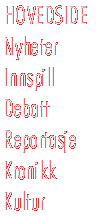
|
|
Redaktør: Teknisk ansvarlig:
|
|
Spørsmål
angående engelsk kan stilles til språkrådgiver
Stewart Clark, Studieavdelingen, e-post: stewart.clark@adm.ntnu.no,
British place-names The names of British towns and cities reflect the history of Britain. The Celts have given us Dover, meaning water. The Romans left us with the Latin castra meaning a camp that developed into place- names such as Doncaster, Lancaster, Chester, Manchester and Cirencester and other -cester names. The Angles and Saxons brought endings like -burh, meaninga fortified settlement, to English and these remain in -bury names, such as Tilbury, Canterbury and also -borough (pronounced «burra») such as Scarborough. Burh is also related to the Germanic -burg that has given the -burgh ending found in Edinburgh (pronounced «eddin-burra»). The Vikings brought Scandinavian terms like -by, meaning a village, to Britain which has given place-names such as Derby, Grimsby, Rugby. Another Scandinavian term is -thorp,meaning an outlying village, which is found in places such as Scunthorpe. The Normans introduced numerous French words into Middle English such as mont, which has given us Richmond, meaning a hill, and Beaumont, a beautiful hill. Some British place-names reflect the activities of the locality. Places known for their salt-works had the ending wich, such as Droitwich. It is possible that some of the -wich endings today are also derived from the Old English wick meaning a village. If we ignore the etymology and consider the pronunciation, the -wich endings sometimes cause problems for foreigners and visitors to Britain. Here it is worth remembering that although Norwich is pronounced «nor-ritch» and Ipswich is pronounced «ips-witch», Greenwich is usually pronounced «grin-nitch», not «green witch» as a radio reporter on NRK repeated called it during a recent programme about the new millennium. (Note that Greenwich Village in New York is pronounced «grennitch».) A useful reference book that includes the pronunciation of British place-names is the BBC Pronouncing Dictionary of British Names, Oxford University Press. The editor is Graham Pointon who works for the BBC in London and was formally a lecturer at our Department of English. Tricky words millennium, millenary Millennium (Norw. tusen år,
tusenårsrike) means a period of 1000 years: «The
scare about the millennium bug made many computer programmers
wealthy in 1999». The plurals are millennia or
millenniums. A millennium is typically, but not
always, calculated from the traditional birth of Christ. In
Christian Theology, the millennium is the thousand-year
reign of Christ. In another sense, millennium is the
anniversary of a thousand years. Note that millennium
and millennial are spelt with two n's. Misspelling millennium
is a common error even among native English Millenary (Norw. tusen år) means a period of 1000 years or a thousandth anniversary. A millenary does not have to be calculated from the traditional birth of Christ. Note that millenary is only spelt with a single «n». elk, moose Elk (Norw. elg) means the large animal in the deer family: «The elk are moving this way». Elk is usually the same in the singular and plural, but an alternative plural is elks. Moose (Norw. elg) means an elk.
This is the American English term. Note that this is unchanged
in the singular and plural. Never confuse moose with
the soundalike mousse which means a soft whipped dessert
(Norw. Enlightening English «Mousse hunting is one of our specialities». (Tourist brochure from a rural hotel in Nord-Trøndelag) «Port Whale - Norwitch 0-1» (NRK's soccer results, October 1999) Two tourists were driving through Wales. As they were approaching Llanfairpwllgwyngyllgogerychwyrndrobwllllantysiliogogogoch
they started arguing about the pronunciation of the town's name.
They stopped for lunch and asked the waitress «Before
we order, could you please settle an argument for us? Would
you please pronounce where we are... very slowly?»
|

 Stewart's
Corner
Stewart's
Corner